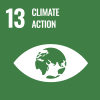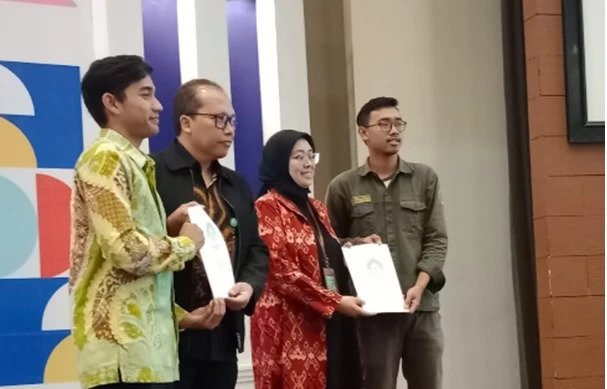The Forestry Student Executive Board (LEM) has presented several recommendations regarding climate change mitigation efforts to the Ministry of Environment and Forestry.
The recommendations result from a policy brief on actualizing youth’s existence in climate change mitigation. The comprehensive study and policy brief was handed over to the Director of Forest Product Management and Marketing, Krisdianto, during the Pojok Iklim Goes to Campus event on June 9, 2023, at UGM.
The LEM conveyed four policy recommendations. First, as the policyholder, the Ministry of Environment and Forestry needs to review the policies that govern the participation and expression rights of youth and all elements of society in climate change mitigation efforts. This way, transparency in providing information to the public can be reinstated.
Second, the Ministry of Environment and Forestry is expected to determine a fair price as the carbon pricing benchmark proposed by the IMF. They should also advocate this proposal to the NDCs of G20 countries, aiming to achieve the desired temperature reduction by 2030.
Third, carbon estimation calculations should be carried out using more accurate and representative approaches for each forest stand, with strict enforcement on all relevant companies. Fourth, it is important to encourage the public, including young people, to be more responsive to climate change issues.
The Pojok Iklim, organized by the ministry’s Climate Change Control Advisory Board (DPPPI), invited various stakeholders, including youth, to generate recommendations, methodologies, and best policy practices to address climate change. Collaborating with the United Nations Development Programme (UNDP) in Indonesia, this event focused on “Youth’s Contribution to Climate Action.”
Present as the keynote speaker was Dr. Dwiko Budi Permadi, the faculty’s vice dean for academic and student affairs. Among the speakers were Gielbran Muhammad Noor, the chairperson of the UGM Student Executive Board; Aza Khiatun Nisa, a traveling enthusiast from the Faculty of Philosophy; Elvina Yulia, the President of the UGM Society of Renewable Energy (SRE); Bella Widyoko from UNDP Indonesia; and reviewer Dr. Andung B. Sekaranom from the Faculty of Geography.
Dr. Dwiko Budi Permadi emphasized that an imbalance in the relationship between humans and nature has occurred, leading to various damages, including climate change. The prevailing anthropocentric view has caused an imbalance in the relationship between humans and nature.
He also mentioned that large-scale deforestation occurred during the reform era, significantly contributing to climate change. To minimize these issues, he stressed the need for mitigation through various activities, such as developing renewable and environmentally friendly energy, preserving high conservation value areas, waste recycling efforts, and deforestation prevention through reforestation.
Noor mentioned several small-scale actions students took that have significantly impacted climate change response. One of them is tree planting activities, including mangroves.
Nisa shared stories about expeditions conducted on Mentawai Island. The excursions were not merely for leisure but aimed to understand the close relationship between the island’s indigenous communities and nature, mainly the forest, and how the activities of the local people can help reduce emissions.
Widyoko presented the role of UNDP Indonesia in climate change mitigation. She called on all elements of society to be responsive to the current climate change situation. Yulia then discussed other actions that youth could take through the work programs of SRE.
Author: Ika
Photo: Forestry Student Executive Board



